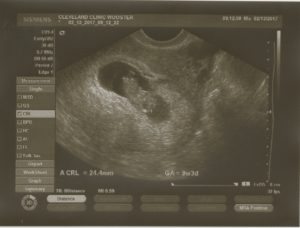It’s the pain and sense of loss that doesn’t ever really die — the pain a child feels when their father abandons the family, or was never there in the first place. The sense of loss when the man who had an obligation to be a pillar in the life of his child decides he has better things to do. It may be masked with anger, but the pain is always there. Our prisons here in America are filled with angry adults who were once sad children, who became angry children, who in turn became angry adults. Abandonment breeds hopelessness, and hopelessness kills. There are many degrees of abandonment, from the father who just stuck around long enough to get their mother pregnant, to the divorced dad who never shows up again. Or sometimes the wandering type who shows up unexpectedly, raising hopes and making promises and then disappearing again. Then there are the fathers who are physically there, but emotionally they are far away, or there for one child but not the others. Being abandoned strikes at the deepest places of fear and insecurity in a child. Being abandoned undermines every aspect of the child’s psyche.
The abandoned child does not have the luxury of feeling completely grounded, because the foundation of their life is incomplete.
The abandoned child grows up in incomplete, unrealized love and longing — regardless of how loving the remaining parent is.
The abandoned child cannot completely relate to reasonable expectations of what a mother is or what a father is.
The abandoned child does not see the world in terms of security, because they grow with the belief that trust is a fairy tale.
The abandoned child will often internalize the blame for the parent not loving them enough to want to stay.
The abandoned child often cannot conceive of a scenario where God the Father will not abandon them at the first sign of trouble — or when He has had enough of their flaws. They often imagine He is looking for any excuse to leave.
Such a person is not going to be able to make a true emotional connection to God the Father, because the prerequisites to such an attachment were not constructed in their early life. I have to tell you, that based on my reading of scripture from front to back, our Heavenly Father is literally screaming from just about every page that He is not like that. And not even every earthly father is like that, some fathers choose that path because they choose to esteem themselves and they choose not to become entangled in committed, loving relationships that require responsibility. They decided to withhold themselves from those who were born to need them. It was a personal choice rooted in their personal character flaws, a choice that never could have been changed by the inherent worth of the child. When a choice like that is made, the merit of the child is not taken into consideration. A child can be a perfectly behaved, straight A student, Prom Queen or Quarterback, doing all the housework and cooking and earning a living on the side to provide for the family — and it will not enter into the decision. No child, really, no one, can ever be good enough to turn back a decision that someone really wants to make. There are some things out of our control, and someone else’s life choices, no matter how deeply they impact us, are at the top of that list.
So before I go any further, let me sum it up. If you were emotionally or physically abandoned by a parent, even if they tell you it was about you or act like it was your fault, it was really because of what they wanted, not about what you deserved, which was a stable, loving home — whether you were Prom Queen or the social outcast. If you were abandoned, you need to really come to terms with that or everything I am about to share with you about the character of God the Father will go right in one ear and out the other.
From the beginning, the revealed character of God as Father is that of a father who will never leave us, nor forsake us — EVEN when we deserve it. What He does do is withdraw His protection, but not until it is His only remaining option to drive us towards repentance when we have decided in our hearts to hate Him. Withdrawing from us is only ever something we decide for Him to do, and it can’t be done lightly, and it doesn’t happen in an instant, and it is generally with the intent of future restoration. Withdrawal is not the same as abandonment, withdrawal has a purpose towards the benefit of the person being withdrawn from, abandonment is entirely about the person doing the abandoning, for their own purposes.
Gen 28:15b I will not leave thee, until I have done that which I have spoken to thee of
This was the promise to Jacob, and the things referenced to were, in verse 14 “And thy seed shall be as the dust of the earth, and thou shalt spread abroad to the west, and to the east, and to the north, and to the south: and in thee and in thy seed shall all the families of the earth be blessed.”
Here we see an eternal promise, a promise not to leave someone until things that would never occur in his lifetime would take place. YHVH has still never left Jacob, even though Jacob has been asleep now for thousands of years. And Jacob wasn’t always wise, he wasn’t always righteous in all his actions, Jacob made mistakes, and so did his children. But the promise to never leave and forsake was never based on Jacob’s worthiness, it was based upon the character of God, which is a constant.
To the casual eye, the Father portrayed in the Tanakh, what Christians call the “old” Testament, is very violent and unpredictable. But it only appears that way when we fail to look at the whole picture. And that picture is always a picture of a Father doing whatever it takes to protect His beloved family from external and internal dangers and guide them towards righteousness leading to life. But when we lack the perspective of a healthy father/child relationship, we will miss it. We will see an unpredictable tyrant, ready to leave us at any moment, instead of facing the kind of Father who patiently allows decades of rebellion to pass before taking drastic action – and even then not withdrawing His love, but proving it through creating situations where His children have a choice between returning to Him or dying at the hands of their oppressors. Because He sees rebellion as a life or death situation, He has to communicate that to the children He loves by lifting His hand of protection and showing them. But does He ever leave? No.
What do good parents do when their child is rebelling? They discipline because they can see the consequences of the behavior that the child cannot see or simply lacks the maturity to care about. When we look at God’s actions throughout the Word from this vantage point, we start to see two beloved children removed from the tree that would have left them living forever as sinful beings, instead of two people rejected by God. God never left Adam and Eve, He just took them out of danger. In the same way, God never abandoned the children of Israel in the Wilderness, even when they were profoundly irritating. Sometimes He took deadly steps to remove danger from their midst, in order to save the whole nation, but He never left. They complained and He never left, they worshiped the golden calf, and He never left, they refused to go into the Land and He never left, Moses took credit for getting water from the rock himself, and He never left. The nation didn’t drive out all their enemies, and He never left them. Eli and his sons defiled the priesthood and the offerings, and He never left the Nation. Hundreds of years of idolatry off and on, and He disciplined, but never abandoned them.
He doesn’t leave — but He does allow us to leave Him, and sometimes He recognizes the fact that we have left Him, like when He handed the Northern Kingdom of Israel a certificate of divorce, an admission that they had broken the covenant and had long since walked away.
A Father who has that kind of patience, who tries that hard to reign in His children, who frankly puts up with things most of us never would — a Father who continued to love the unlovable, people who in many cases didn’t even desire His love, or even His blessings or His Name — and He never left.
How likely is it, that when He treated the rebellious house of Israel with such patient kindness for so many hundreds of years, when they wanted nothing to do with Him — well, how likely is it that when someone longs for Him and really does desire to do right that He will abandon them for what, in comparison, are very small things? Its impossible.
Deut 4:30 When thou art in tribulation, and all these things are come upon thee, even in the latter days, if thou turn to the Lord thy God, and shalt be obedient unto his voice;
31 (For the Lord thy God is a merciful God;) he will not forsake thee, neither destroy thee, nor forget the covenant of thy fathers which he sware unto them.
We are living in the latter days, and we have a promise written here that if we turn to Him and obey Him that He will not destroy us, nor forsake us. Unlike some earthly fathers, He will never do the leaving. We have all the control over who leaves the relationship. We have to leave, its all on us, but that doesn’t mean we can behave however we want, because if we are rebellious, we are already leaving Him in our hearts. But that is our choice. We can leave, He won’t. He won’t break the Covenant, but we can. In many ways, this relationship with our Heavenly Father is nothing like the relationships we have with our earthly fathers. We decide who stays and who goes. If we want Him, then we stay with Him and He will not leave. If we want him, then we treat Him like a good father deserves to be treated, by beginning to give Him our trust, to acknowledge that He knows better than we do what is good and bad, that we live in His house according to His rules, and when we fail, we repent and return to Him.
The father of the prodigal son didn’t move away, or build a huge wall, or reject his son, or drive him away, or threaten him. He let him go, but He also accepted him back because his heart was genuine. The prodigal son was a fool who became wise, who learned that the ways of his father, which he had despised, actually led to a good life. The father had the wisdom and grace to let him go and accept him back, and he accepted him back because in his heart, he had never left his son, his son had just left him.
God has never destroyed nor abandoned anyone who ever truly wanted HIM. And if you are the kind of person who is afraid to get close because you are afraid He will make an exception in your case — then that’s just proof that you want Him very desperately indeed. If you can find anyone in scriptures who wanted Him, who really wanted him, who He abandoned and callously left, then you have a perfect right to suspect Him of being potentially unfaithful to you. But if you can’t find anyone like that, with all the wickedness and provocation He endured, then it’s time to let your guard down and realize that He was telling the truth.
He isn’t fickle. He isn’t chaotic. He doesn’t have anywhere more important to be or other people He would rather be with. His dedication to you is based on His perfection, not your imperfection. He isn’t spending His time anxiously waiting for you to screw up so that He can have an excuse to leave you. His character is long-suffering, and forgiving and full of grace and it always has been. He is not anxious to depart but to dwell within, and He has proved it for millennia with people way more challenging than you are.
If your heart longs for Him, it is because He planted that longing within you — not to crush you with hopelessness, but to draw you near to where He wants you to remain. If your distrust hasn’t driven Him away so far, then I can safely say that you owe Him the benefit of the doubt. Its not going to be easy, but I can assure you that it is worth it. He isn’t the one who abandoned you, but He is the one who has adopted you from the one who abandoned you. He must have seen something incredibly special.
You’ve spent your life judging your earthy father based on his revealed character, its time to judge our Heavenly Father according to His revealed character. We have a choice in this life, to base our sense of stability and worth upon the memories of a broken pillar, or to take a chance, and lift our eyes and notice the ancient, strong, enduring pillar that was always there in the background. I love Darlene’s picture here because my eyes were drawn to the broken pillar, and I had to make a concerted effort to notice the intact one. Isn’t that such a picture of our lives?

Copyright Darlene Dine, reproduction without permission is prohibited
 Last year I publicly went through the most common yet least reported type of postpartum depression (Part 1 and 2 here) – the type based on true tragedy, unrelated to a chemical imbalance, the kind of depression that has, as its source, actual loss, and grief. Having gone through many miscarriages, and faced with the almost absolute lack of compassion in the believing community, I and many others were forced to stomp down and swallow that pain, to face it alone, to endure shaming because of the unresolved and therefore unending grief. The end result was catastrophic – unresolved grief, anger, bitterness, shame, jealousy – you name it. I lived it day by day for over sixteen years until the day came when God said, “No more, this is going to get dealt with now.” Just like that, He stripped away all of my protective mechanisms and the full onslaught of the pain was raw and inescapable. It was horrific and outside of my control – I was literally insane with grief and anger at times. It got worse before it got better – but now it is finally better. I saw the first hard evidence of healing two weeks ago when a friend asked me if I minded if she named her baby after me. My response was, “You’re pregnant?”
Last year I publicly went through the most common yet least reported type of postpartum depression (Part 1 and 2 here) – the type based on true tragedy, unrelated to a chemical imbalance, the kind of depression that has, as its source, actual loss, and grief. Having gone through many miscarriages, and faced with the almost absolute lack of compassion in the believing community, I and many others were forced to stomp down and swallow that pain, to face it alone, to endure shaming because of the unresolved and therefore unending grief. The end result was catastrophic – unresolved grief, anger, bitterness, shame, jealousy – you name it. I lived it day by day for over sixteen years until the day came when God said, “No more, this is going to get dealt with now.” Just like that, He stripped away all of my protective mechanisms and the full onslaught of the pain was raw and inescapable. It was horrific and outside of my control – I was literally insane with grief and anger at times. It got worse before it got better – but now it is finally better. I saw the first hard evidence of healing two weeks ago when a friend asked me if I minded if she named her baby after me. My response was, “You’re pregnant?”
